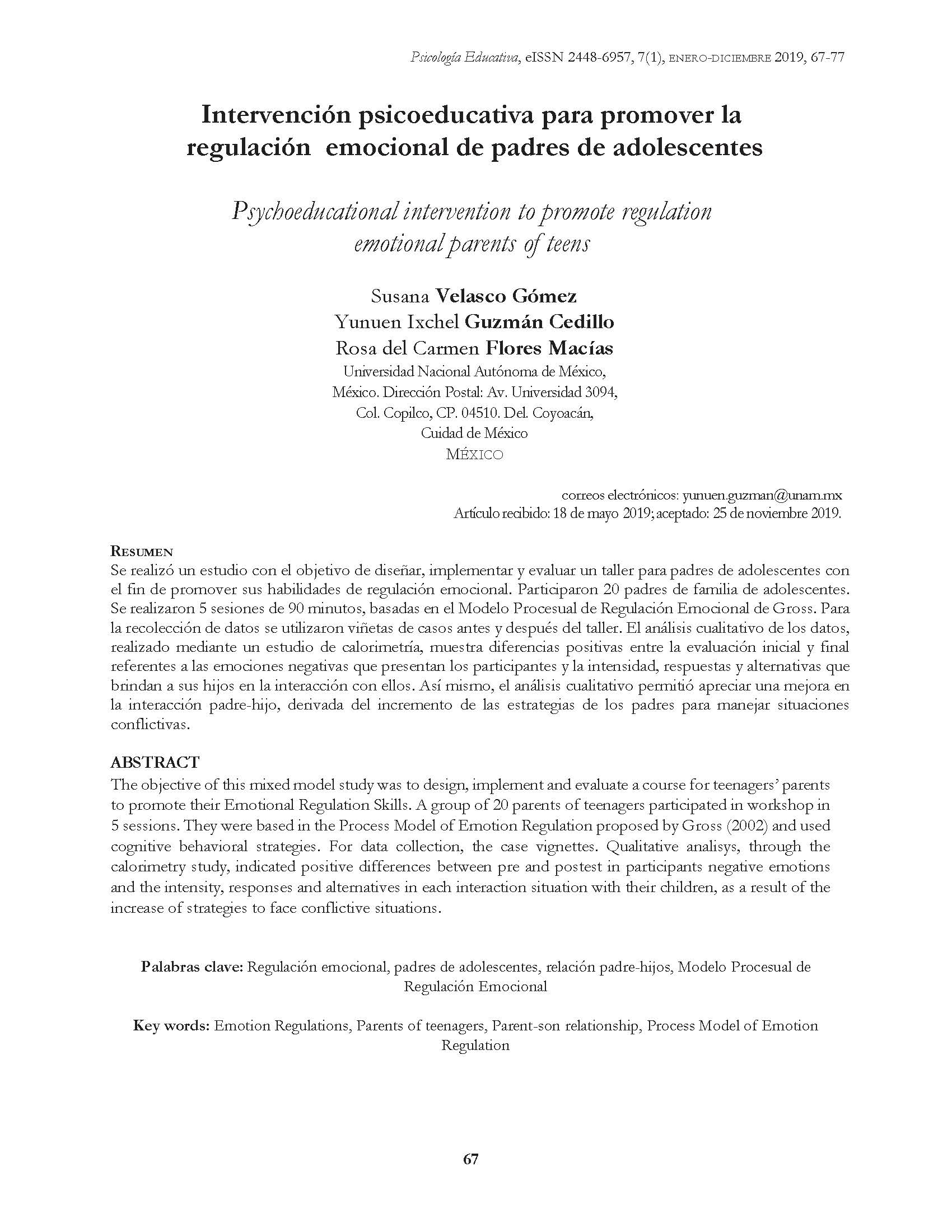Abstract
The objective of this mixed model study was to design, implement and evaluate a course for teenagers’ parents to promote their Emotional Regulation Skills. A group of 20 parents of teenagers participated in workshop in 5 sessions. They were based in the Process Model of Emotion Regulation proposed by Gross (2002) and used cognitive behavioral strategies. For data collection, the case vignettes. Qualitative analisys, through the calorimetry study, indicated positive differences between pre and postest in participants negative emotions and the intensity, responses and alternatives in each interaction situation with their children, as a result of the increase of strategies to face conflictive situations.
References
Barros, L. Goes, A. R. y Pereira, A. I. (2015). Parental self-regulation, emotional regulation and temperament: Implications for intervention. Estudios de Psicología Campiñas. Vol. 32 (1). recuperado de la página electrónica: : http://www.scielo.br.pbidi.unam.mx:8080/pdf/estpsi/v32n2/0103-166X-estpsi-32-02-00295.pdf
Bochi, A., Friedrich, D. y Barbosa P., J. T. (2016). Revis~ao sistemática de estudos sobre programas de treinamento parental. Trends in psychology. Vol. 24 (2). pp. 549-563.
Fabrizio, C. S., Stewart, S. M., Ip Y., A. K. y Lam, T. H. (2014). Enhancing the parent-child relationship: a Hong Kong community-based randomized controlled trial. Journal of family psychology. Vol 28 (2). pp. 42-53. DOI: 10.1037/a0035275
Fabrizio et al. (2015). Parental emotional management benefits family relationship: A randomized controlled trial in Hong Kong, China. Behavioral Research and Therapy. Vol 17. pp. 115-124. DOI: 10.1016/j.brat.2015.05.011
Garbacz, S. A.; Swanger-Gagné, M. S y Sheridan, S. M. (2015). The Role of School–Family Partnership Programs for Promoting Student SEL. En: Durlack, J. A.; Domitrovich, C. E.; Weissberg, R. P. y Gullotta, T. P. (2015). Handbook in social and emotional learning: Research and practice. pp. 244-259. New York: The Guilford Press.
Gómez P., O. y Calleja B., N. (2016). Regulación emocional, red nomológica y medición. Revista Mexicana de Investigación en Piscología. Vol. 8 (1). pp. 96-117. Recuperado de la página electrónica: www.revistamexicanadeinvestigacionenpsicologia.com/articulos/render/176/1
Gross, J. J. (2002). Emotion regulation: affective, cognitive, and social consequences. Psychophysiology. Vol. 39. USA: Cambridge University Press. DOI: https://doi.org/10.1017/S0048577201393198
Gross, J. J. (2014). Emotion regulation: Conceptual and empirical foundations. En Gross, J. J. (2014). Handbook of emotion regulation. pp. 3-20. New York: The Guilford Press.
John, O P. y Gross, J. J. (2004). Healthy and unhealthy emotion regulation personality processes, individual differences, and life span development. Journal of personality. Vol 72 (6). DOI: 10.1111/j.1467-6494.2004.00298.x
Kehoe, C. E.; Havighurst, S. S. y Harley, A. E. (2014). Tuning in to Teens: Improving parents emotion socialization to reduce youth internalizing difficulties. Social Development. Vol 23 (2). pp 413-431. DOI: 10.111/sode.12060
King, K. P. (2017). Andragogy illustrated. Technology and innovation in adult learning. Jossey-Bass: San Francisco. Recuperado de la página electrónica: http://proquestcombo.safaribooksonline.com.pbidi.unam.mx:8080/9781119049616?uicode=unammx
Li, L.; Bai, L.; Zhang, X. & Yinghe, C. (2018). Family functioning during adolescence: The role of parental and maternal emotional dysregulation and parent-adolescent relationship. Journal of child and family studies. Vol. 27 (4). pp. 1311-1323. DOI: https://doi.org/10.1007/s10826-017-0968-1
Oana A., D.; Capris, D. y Jarda. A, (2017). Online coaching of emotion-regulation strategies for parents: Efficacy of the online Rational Positive Parenting Program and attention Bias Modification Procedures. Frontiers of Psychology. Vol. 8 (500). DOI: 10.3389/fpsyg.2017.00500
Pereira P., Z. (2011). Los diseños de métodos mixto en la investigación en educación: Una experiencia concreta. Revista Electrónica Educare. Vol. 15 (1). pp. 15-29. Recuperado de la página electrónica: http://www.redalyc.org/html/1941/194118804003/
Ravindran, N. Engle, J. M., McElwain, N. L. y Krammer, L. (2015). Fostering Parents’ emotion regulation trough a sibling-focused experimental intervention. Journal of family psychology. Vol. 29 (3). pp458-468. DOI: 10.1037/fam0000084
Rutherford, H. J. V.; Wallace, N. S.; Laurent, H. K. y Mayes, L. C. (2015). Emotion regulation in parenthood. Developmental review. DOI: 10.1016/j.dr.2014.12.008
Salari, R.; Ralph, A. y Sanders, M. R. (2014). An Efficacy trial: Positive Parenting Program for parents of teenagers. Behavior change. Vol 31 (1). pp. 34-52. DOI. 10.1017/bec.2013.31
Spies, C., Seale, I. & Botma, Y. (2015). Adult learning: What nurse educators need to know about mature students. Curationis. Vol. 38(2). DOI: http://dx.doi.org/10.4102/ curationis.v38i2.1494
Thompson, R. A. (2014). Socialization of emotion and emotion regulation in the family. En Gross, J. J. (2014). Handbook of emotion regulation. pp. 173-186. New York: The Guilford Press.

This work is licensed under a Creative Commons Attribution-NonCommercial-NoDerivatives 4.0 International License.
Copyright (c) 2024 Universidad Nacional Autónoma de México


